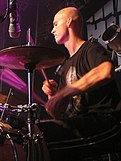Portal:Poland
Welcome to the Poland Portal — Witaj w Portalu o Polsce

 Poland is a country in Central Europe, bordered by Germany to the west, the Czech Republic to the southwest, Slovakia to the south, Ukraine and Belarus to the east, Lithuania to the northeast, and the Baltic Sea and Russia's Kaliningrad Oblast to the north. It is an ancient nation whose history as a state began near the middle of the 10th century. Its golden age occurred in the 16th century when it united with the Grand Duchy of Lithuania to form the Polish–Lithuanian Commonwealth. During the following century, the strengthening of the gentry and internal disorders weakened the nation. In a series of agreements in the late 18th century, Russia, Prussia and Austria partitioned Poland amongst themselves. It regained independence as the Second Polish Republic in the aftermath of World War I only to lose it again when it was occupied by Nazi Germany and the Soviet Union in World War II. The nation lost over six million citizens in the war, following which it emerged as the communist Polish People's Republic under strong Soviet influence within the Eastern Bloc. A westward border shift followed by forced population transfers after the war turned a once multiethnic country into a mostly homogeneous nation state. Labor turmoil in 1980 led to the formation of the independent trade union called Solidarity (Solidarność) that over time became a political force which by 1990 had swept parliamentary elections and the presidency. A shock therapy program during the early 1990s enabled the country to transform its economy into one of the most robust in Central Europe. With its transformation to a democratic, market-oriented country completed, Poland joined NATO in 1999 and the European Union in 2004, but has experienced a constitutional crisis and democratic backsliding since 2015.
Poland is a country in Central Europe, bordered by Germany to the west, the Czech Republic to the southwest, Slovakia to the south, Ukraine and Belarus to the east, Lithuania to the northeast, and the Baltic Sea and Russia's Kaliningrad Oblast to the north. It is an ancient nation whose history as a state began near the middle of the 10th century. Its golden age occurred in the 16th century when it united with the Grand Duchy of Lithuania to form the Polish–Lithuanian Commonwealth. During the following century, the strengthening of the gentry and internal disorders weakened the nation. In a series of agreements in the late 18th century, Russia, Prussia and Austria partitioned Poland amongst themselves. It regained independence as the Second Polish Republic in the aftermath of World War I only to lose it again when it was occupied by Nazi Germany and the Soviet Union in World War II. The nation lost over six million citizens in the war, following which it emerged as the communist Polish People's Republic under strong Soviet influence within the Eastern Bloc. A westward border shift followed by forced population transfers after the war turned a once multiethnic country into a mostly homogeneous nation state. Labor turmoil in 1980 led to the formation of the independent trade union called Solidarity (Solidarność) that over time became a political force which by 1990 had swept parliamentary elections and the presidency. A shock therapy program during the early 1990s enabled the country to transform its economy into one of the most robust in Central Europe. With its transformation to a democratic, market-oriented country completed, Poland joined NATO in 1999 and the European Union in 2004, but has experienced a constitutional crisis and democratic backsliding since 2015.
From Polish history –
Selected biography –
Selected location –
Did you know –
- ... that Baroness Maria Bal (pictured as Angel of Death) served as a live model for a series of Symbolist portraits of women, as well as nude studies and mythological creatures, by Jacek Malczewski?
- ... that Ruthenian nobility became increasingly Polonized with time?
- ... that the Legislative Sejm of 1919–21 was the first national parliament of the Second Republic of Poland?
- ... that Marcel Déat, the French author of the World War II anti-war slogan Why Die for Danzig?, later became a Nazi collaborator?
Poland now
Recent events
- On 27 October, the discovery of a previously unknown waltz in A minor (manuscript pictured) attributed to Frédéric Chopin, found at the Morgan Library & Museum in New York, was announced.
- On 14 September, southwestern Poland was hit by severe floods caused by heavy rains brought by Storm Boris.
- Poland won 23 medals, including eight gold, at the 2024 Summer Paralympics, ranking 16th in the medal table.
- On 18 August, Polish cyclist Katarzyna Niewiadoma won the 2024 Tour de France Femmes.
- Poland won 10 medals, including one gold, at the 2024 Summer Olympics, ranking 42nd in the medal table.
Ongoing
Constitutional crisis • Belarus–EU border crisis • Ukrainian refugee crisis
Holidays and observances in November 2024
(statutory public holidays in bold)
- All Saints' Day (grave lanterns pictured), 1 November
- Independence Day, 11 November
Selected image –

Subcategories
You can help!
Topics
Related portals
| Belarus | Czech Republic | Germany | Lithuania | Russia | Slovakia | Ukraine |
| Europe | Catholicism | Communism | European Union |
Associated Wikimedia
The following Wikimedia Foundation sister projects provide more on this subject:
-
Commons
Free media repository -
Wikibooks
Free textbooks and manuals -
Wikidata
Free knowledge base -
Wikinews
Free-content news -
Wikiquote
Collection of quotations -
Wikisource
Free-content library -
Wikiversity
Free learning tools -
Wikivoyage
Free travel guide -
Wiktionary
Dictionary and thesaurus
Wikipedias in the languages of Poland
| Kaszëbskô Wikipedijô Kashubian Wikipedia |
Polska Wikipedia Polish Wikipedia |
Ślůnsko Wikipedyjo Silesian Wikipedia |
Wymysiöeryś Wikipedyj Vilamovian Wikipedia Incubator |
Беларуская • Česky • Deutsch • Հայերեն • Lietuvių • Romani • Русский • Slovenčina • Українська • ייִדיש






























